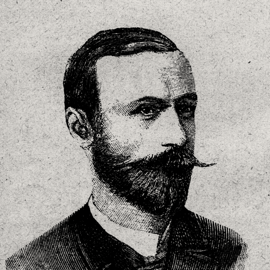Władysław Matlakowski

Władysław Matlakowski (1850–1895) was a respected surgeon, graduate of the medical school at Warsaw University. In 1891 his deteriorating health obliged him to retire. He dedicated himself to ethnographical research, with a particular interest in the mountainous region of Podhale in what is now southern Poland. He translated one Shakespeare play – Hamlet – working on the project for more than a dozen years. In 1894 the play was published in Kraków, accompanied by several hundred pages of introductory material and commentary. All his close friends testified to Matlakowski’s extraordinary, neo-Platonic sensitivity to beauty in nature, art and ethnography. As somebody fighting against illness, and simultaneously devoted utterly to his passions, he inspired strong personal feelings. The unusual intensity of his life was Matlakowski’s response to suffering: not as an escapist pursuit, but rather as a deliberate decision to dedicate himself to a certain set of values and accept the inevitable.
Matlakowski’s work on Hamlet is unique from a historical perspective. He prepared not so much a translation as a bilanguage edition of the play, a choice essentially dictated by the interests of literary criticism. He translated into prose, keeping in the line numbers. In his pursuit of faithfulness he aimed primarily at literal equivalence: he worked word by word, sentence by sentence, sometimes even reproducing the word-order to preserve the logic of the original. He called on a variety of registers, making use of archaisms, dialect and neologisms. He provided an extensive critical apparatus: along with an introduction, there are annotations that include, among other things, explanations of ambiguous words, notes on interpretation, and existing criticism. Matlakowski saw the printed pages of his Hamlet a week before he died. His wife, Julia, to whom he dedicated his advance copy of the play, corrected the proofs.
The reception of Matlakowski’s work, both at the time and subsequently, has been dominated by the biographical context. The story of his heroic translation is one of the most moving instances of the power of literary fascination.
The first critical assessments emphasised the volume’s unprecedented scope. In his work on Hamlet Matlakowski relied on the full range of Shakespeare scholarship available at the time, going well beyond the scope of reception in Poland. In later periods, less enthusiastic opinions were shared, touching on Matlakowski’s leaden style, lack of originality and an excessive idealisation of Hamlet. It influenced, however, the approach to the play later taken by Stanisław Wyspiański and Roman Brandstaetter. The translation was never on the stage and only a small number of copies are extant. The first run, prepared at such great personal cost, was lost in a fire shortly after publication. It has not been republished.

Bibliography of translations
William Shakespeare, Hamlet, Prince of Denmark, edited and translated, with introduction, notes and supplements by Władysław Matlakowski M. D., Types of the Typography of the Jagellonian University, Cracow 1894. / Wiljam Szekspir, Hamlet, królewic duński, wydał, przełożył, wstępem, objaśnieniami i przypisami opatrzył Władysław Matlakowski, Czcionkami Tłoczni Wszechnicy Jagiellońskiej, Kraków 1894.
